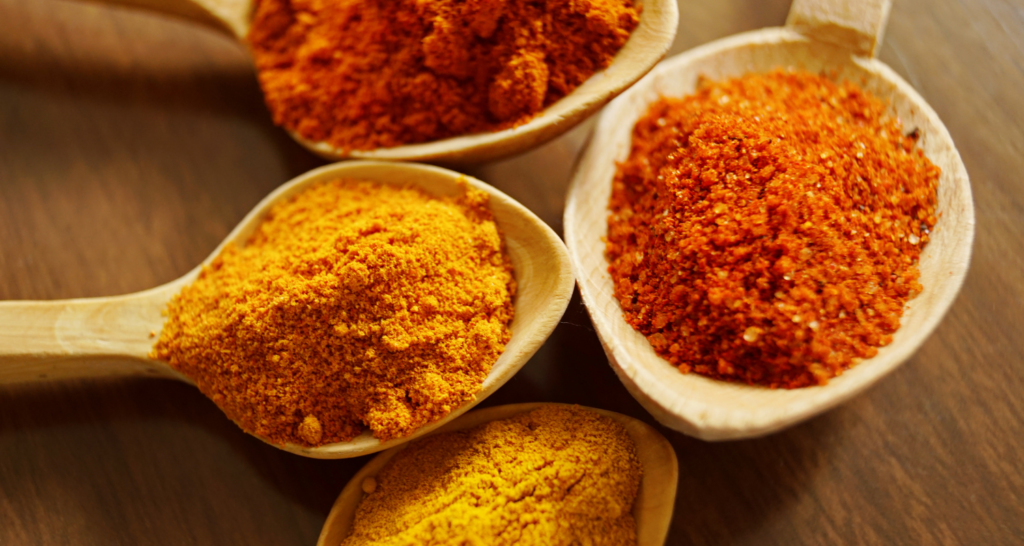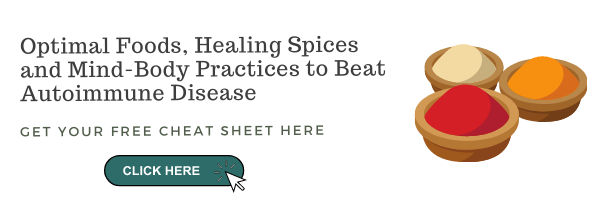Have you been advised by your doctor to “reduce inflammation?” Or maybe you’ve just heard these buzzwords floating around anywhere from the news to social media. Seems these days, everyone is talking about reducing inflammation, and for good reason. High levels of inflammation are correlated with higher risk of disease, including autoimmune disease, diabetes, heart disease, and even possibly depression.
The good news is that an anti-inflammatory diet can be used as an extremely effective tool for reducing inflammation. And, there are even a host of natural spices and ingredients that have been shown over the years to help reduce inflammation as well.
In this article, I’m outlining some of my all-time favorite natural anti-inflammatories so you can pack them into your diet — it will be easy, I promise!
But first, let’s look at exactly what inflammation is, to begin with.
What Is Inflammation?
In it’s most basic form, inflammation itself isn’t necessarily a bad thing. Inflammation is simply your body’s response to injury. When you’re hurt or you have an infection, white blood cells are sent to help heal you and defeat an infection.
But, if you are constantly in a state of stress, or you’re lacking sleep, or your diet is full of processed food….your body can be in a state of chronic inflammation.
When this happens, your body is always responding as if there’s an infection or injury to treat. And it can cause inflammatory markers to skyrocket — which means it’s more likely you’ll develop disease.
In order to keep this situation from arising in the first place, it’s important to pursue a balanced approach to health. Prioritizing sleep, exercise, spirituality, and following an anti-inflammatory diet are all important parts of maintaining health and keeping chronic inflammation at bay.
But there are also some spices and ingredients that can lower inflammation in a meaningful way. If you’re looking for the opportunity to get inflammation down, quickly, it’s time to start adding these healthy superstars to your diet.
The Best Anti-Inflammatory Spices And Ingredients
Here’s my short list of the most potent natural spices with anti-inflammatory properties. Start adding them to your cooking and start reaping the benefits.
Turmeric
Turmeric is the bright golden spice that gives traditional mustard its yellow color. But it’s so much more than a beautiful hue.
Turmeric is perhaps the most widely studied and most revered spice in the world. Studies indicate that it is beneficial for preventing heart disease, cancer, and Alzheimer’s. It can help support the immune system. And it’s been used for treating arthritis and depression.
In short, it’s an amazing spice to sprinkle liberally on just about anything you eat. For maximum absorption, combine it with black pepper and/or a little bit of fat like olive oil.
If it’s mild flavor isn’t your cup of tea, you can always try this in supplement form, too.
Green Tea
Green tea is another that tops the list of most amazing natural anti-inflammatory ingredients. It’s one of those natural compounds that works to decrease inflammation in significant ways.
It’s been studied for it’s positive effect on the heart, it’s ability to lower cholesterol, decrease stroke risk, increase memory, and even help regulate blood sugar. Green tea’s also been linked to weight loss.
Green tea is a beverage you should enjoy daily.
But if the taste doesn’t agree with you, extracts of it’s most potent compounds can be found in supplement form as well.
Omega Fatty Acids
Omegas are fatty acids that you have to get from your diet — they aren’t made by the body.
They are important for a number of functions in your body and they are an integral part of the membranes of your very cells. Omega-3 supplementation has even been shown to be beneficial for reducing inflammation and improving heart attack risk.
Problem is, the standard American diet is shockingly low in these incredibly essential nutrients. Fresh fish, nuts, seeds, and plant oils are the most efficient sources of these fatty acids, so be sure to include them in your diet when you can. And if you can’t, try adding in a supplement.
Ginger
Ginger is another one of those spices that has been touted as a cure all in traditional medicine for thousands of years.
Not only can it help relieve nausea and stomach discomfort, it’s also regarded as a powerful anti-inflammatory that’s been used to treat arthritis, lower blood sugar and improve risk factors for heart disease.
It’s a perfect addition to your spice cabinet, and can be enjoyed dried and powdered or fresh.
Cinnamon
Cinnamon has been recommended as a natural anti-inflammatory for centuries, and researchers are now discovering its role in significantly reducing fasting blood sugar and cholesterol.
Try sprinkling it on your food — but opt for the ceylon cinnamon variety when you can. It’s considered “true” cinnamon and other forms of cinnamon such as cassia can cause issues if taken too often.
Reduce Inflammation Naturally
Sure, you can add these ingredients to your diet and lower your inflammation levels. But sometimes, you need a little extra support and accountability.
That’s where I come in.
I can help you get to the bottom of your health struggles and teach you how to manage inflammation for the rest of your life.
If you’re ready for a customized plan to finally get your health on the right track, let’s chat. You can schedule a free consultation here.
References
“Regulation of Inflammation in Autoimmune Disease – NCBI.” 28 Feb. 2019, https://www.ncbi.nlm.nih.gov/pmc/articles/PMC6421792/.
“The Role of Inflammation in Diabetes: Current Concepts and ….” https://www.ncbi.nlm.nih.gov/pmc/articles/PMC6523054/.
“The role of inflammation in cardiovascular diseases: the ….” 27 May. 2016, https://www.ncbi.nlm.nih.gov/pmc/articles/PMC4892833/.
“Is Depression an Inflammatory Disorder? – NCBI.” https://www.ncbi.nlm.nih.gov/pmc/articles/PMC3285451/.
“Curcumin: A Review of Its’ Effects on Human Health – NCBI.” 22 Oct. 2017, https://www.ncbi.nlm.nih.gov/pmc/articles/PMC5664031/.
“Beneficial effects of green tea: A literature review – NCBI.” 6 Apr. 2010, https://www.ncbi.nlm.nih.gov/pmc/articles/PMC2855614/.
“Omega-3 Supplements and Cardiovascular Diseases – NCBI.” https://www.ncbi.nlm.nih.gov/pmc/articles/PMC4153275/.
“The Amazing and Mighty Ginger – Herbal Medicine – NCBI ….” https://www.ncbi.nlm.nih.gov/books/NBK92775/.
“Cinnamon: A Multifaceted Medicinal Plant – NCBI – NIH.” 10 Apr. 2014, https://www.ncbi.nlm.nih.gov/pmc/articles/PMC4003790/.



